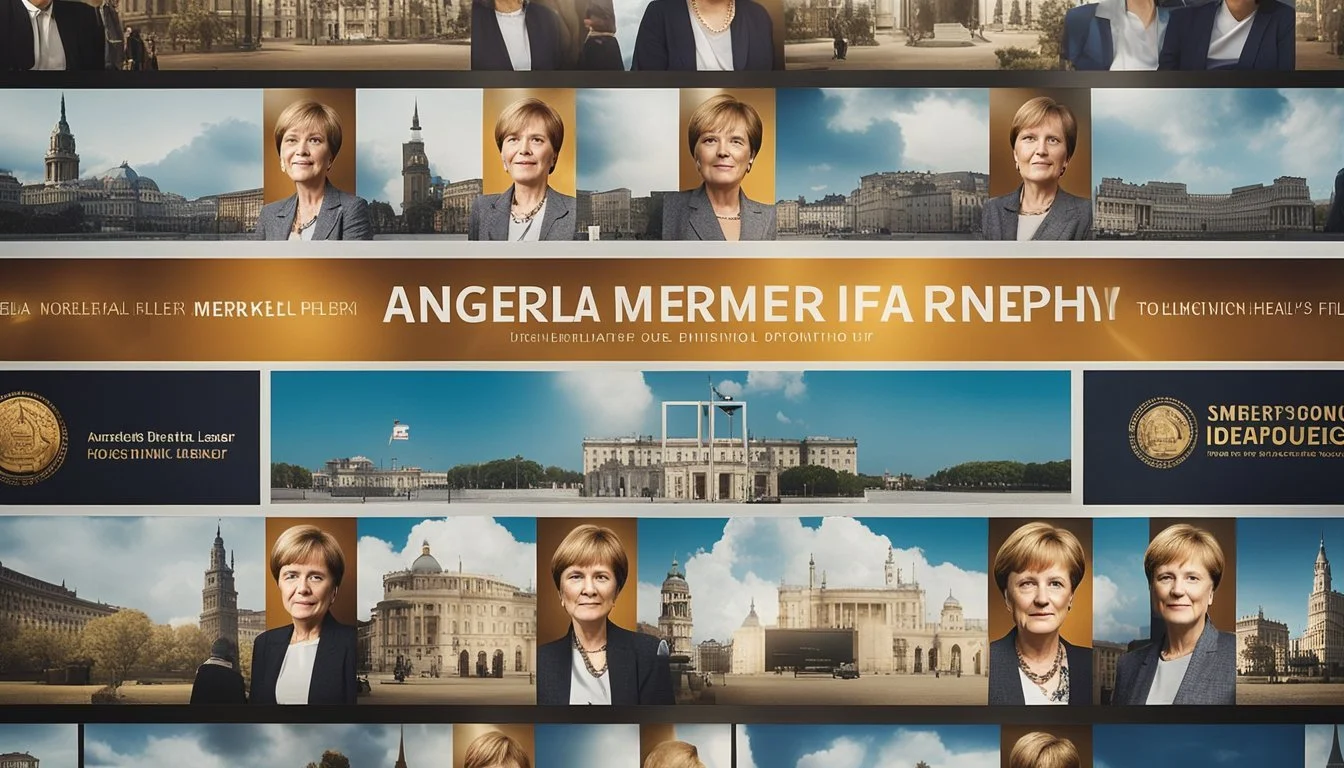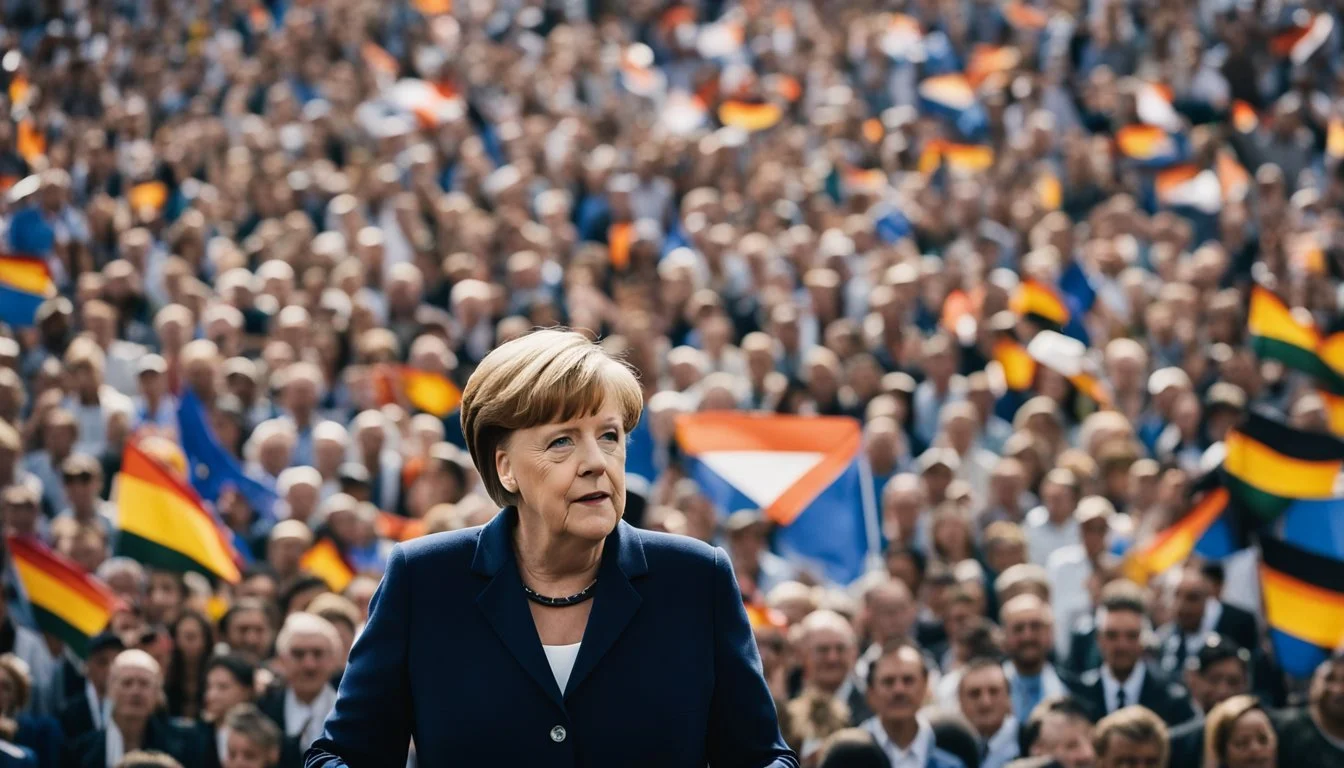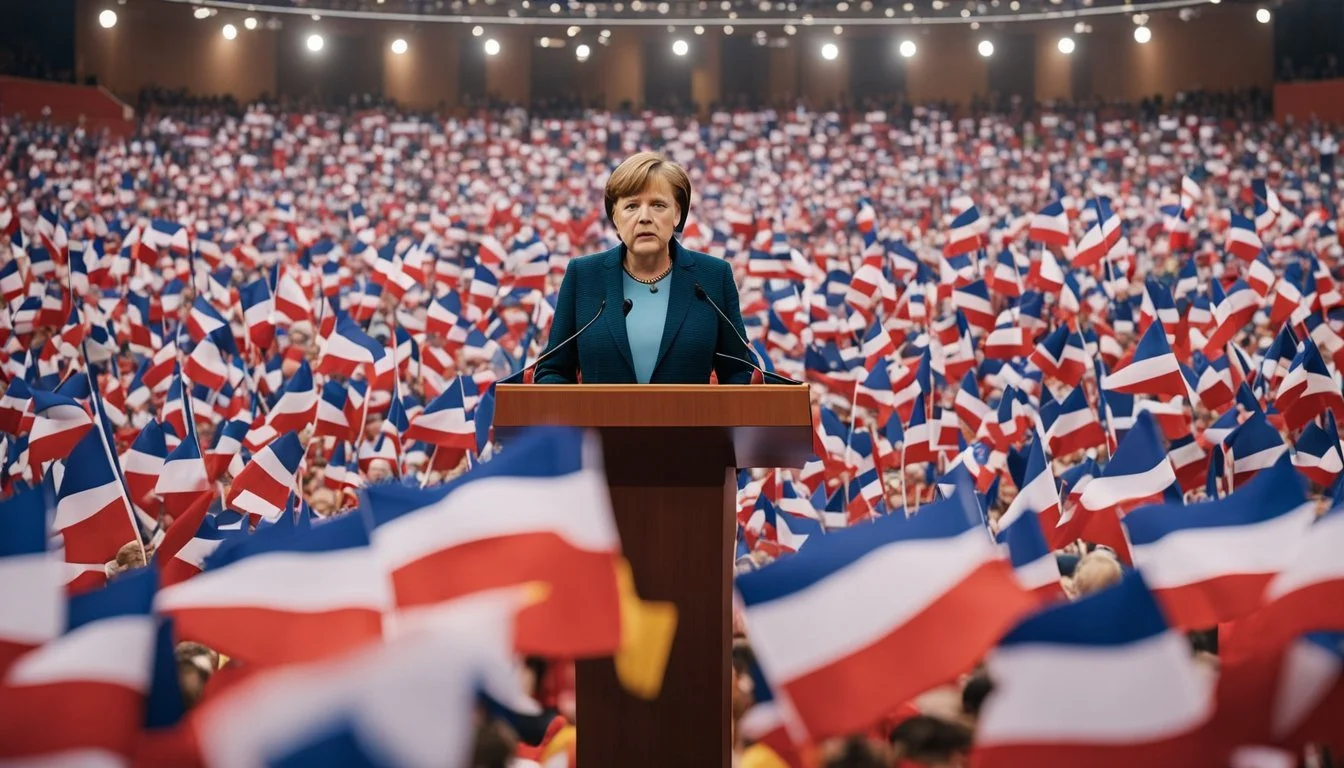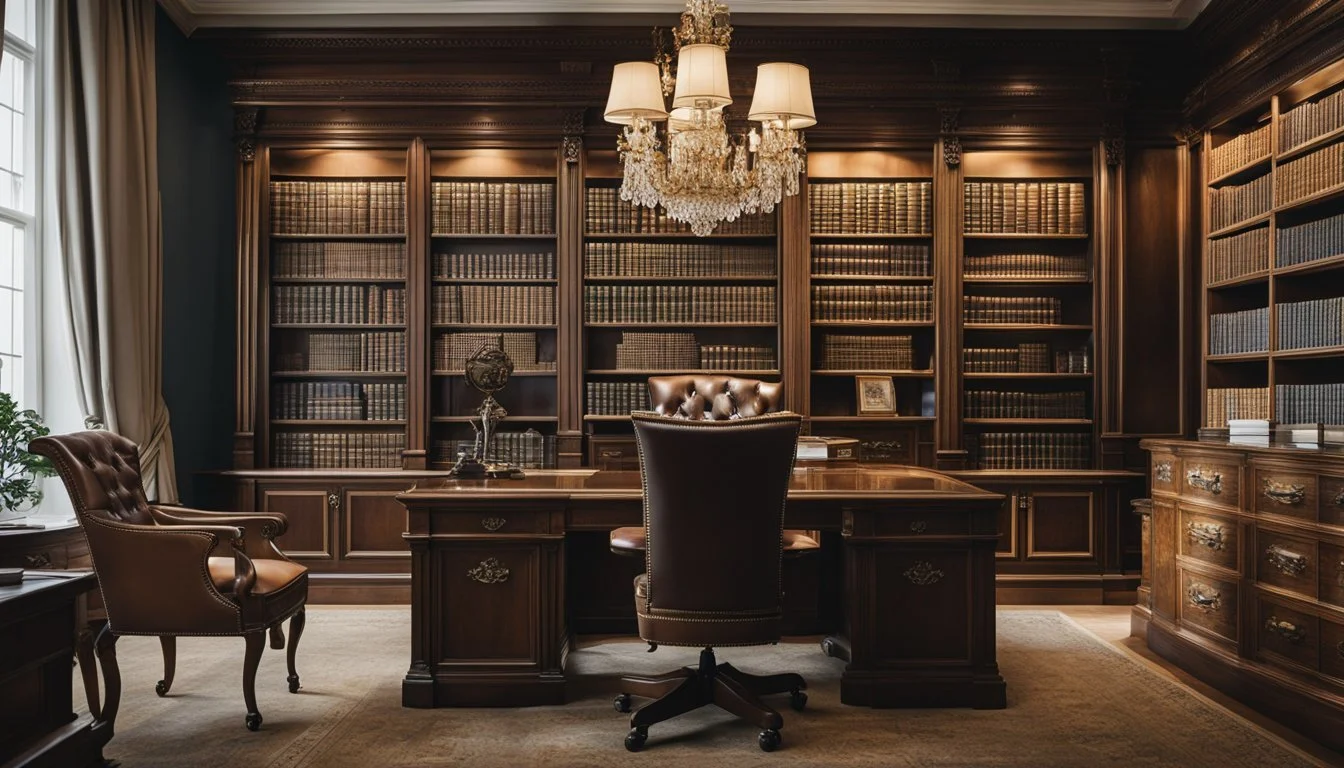8 Documentaries on the Political Journey of Angela Merkel
Insights and Leadership
Angela Merkel's tenure as Germany's Chancellor spanned 16 years, marking an era of significant political influence and leadership. Across various documentaries, audiences can explore her journey through global crises, her calm and strategic approach to governance, and her impact on both German and international politics.
For those seeking to delve deeper into Merkel's legacy, these documentaries offer insights into her political life and the factors that shaped her vision. From her early years to her rise as one of the most powerful women in the world, these films provide a comprehensive look at the milestones and challenges of Merkel's remarkable career.
1) "Angela Merkel’s Political Odyssey" by Richard Evans (2016)
Richard Evans' documentary, "Angela Merkel’s Political Odyssey," offers an in-depth look at Angela Merkel’s rise in German politics. The film chronicles her early years in East Germany, studying physics, and her eventual entrance into the political arena post-reunification.
The documentary provides a detailed account of Merkel's ascent within the Christian Democratic Union (CDU). It highlights her strategic and methodical approach to leadership, which enabled her to become Germany's first female chancellor.
Interviews with political analysts, colleagues, and Merkel herself give viewers insight into her decision-making processes and key moments in her career. The documentary examines her relations with other world leaders and her stance on pivotal issues such as the Eurozone crisis, the refugee crisis, and climate change.
Evans' film is lauded for its thorough research and balanced portrayal of Merkel's political life. The documentary successfully captures the complexity and dynamism of her tenure. The film is a valuable resource for anyone seeking to understand Merkel’s significant impact on German and global politics.
For more information, visit IMDb.
2) "The Making of Merkel" by Margret Müller (2015)
"The Making of Merkel" by Margret Müller is a documentary that sheds light on the life and career of Angela Merkel, the former German Chancellor.
The documentary explores Merkel's rise to power, offering an in-depth look at her early life, political career, and her role in shaping modern Germany.
Margret Müller uses a mix of interviews, archival footage, and expert analysis to present a comprehensive view of Merkel's impact on both national and international politics.
This film provides valuable insights into Merkel's leadership style and decisions that have defined her tenure.
For more information about the documentary, you can visit The Making of Merkel on IMDb.
3) "Leadership in Crisis: Angela Merkel’s Story"
"Leadership in Crisis: Angela Merkel’s Story" (2020) examines Angela Merkel's role during significant European and global crises. It delves into moments such as the Eurozone financial breakdown, the migrant influx, and the COVID-19 pandemic. The documentary provides insight into how Merkel navigated these challenges with a combination of diplomacy and pragmatism.
The film features interviews with political analysts, journalists, and politicians who observed Merkel's leadership up close. These perspectives help viewers understand the decisions and strategies she employed to maintain stability. Archival footage further enriches the narrative, showing her at critical junctures.
This documentary also explores Merkel's ability to garner support within the European Union. Her collaborative approach often contrasted with other leaders, showcasing her unique stance in international politics. For more details, you can visit IMDB or Wikipedia.
4) "The Iron Chancellor" by Geert Wilders (2019)
"The Iron Chancellor" by Geert Wilders dives into the political career of Angela Merkel with a critical lens. This documentary covers her rise in German politics and her significant influence on European affairs.
The film begins with Merkel's early political ventures within the Christian Democratic Union (CDU). It then transitions to her ascent to the role of Chancellor, a position she held for over 15 years.
Wilders provides a detailed look at key decisions Merkel made during her tenure. These include her handling of the Eurozone crisis and her stance on immigration, which sparked considerable debate.
The documentary also features interviews with political analysts and insiders who offer varying perspectives on Merkel's leadership style. This allows viewers to understand the different facets of her political journey.
For more information: The Iron Chancellor on IMDb
5) "Merkel: The Unauthorized Biography" by Gina Thomas (2019)
"Merkel: The Unauthorized Biography" by Gina Thomas offers a detailed look at Angela Merkel's life and political career. Released in 2019, this documentary delves into her rise from an East German scientist to one of the world's most influential leaders.
Through interviews and archival footage, the documentary provides insight into Merkel's defining moments and political strategies. The film examines her approach to leadership and pivotal decisions, such as her handling of the Eurozone crisis and the refugee influx.
The unauthorized nature of this biography allows for a candid portrayal, highlighting both her achievements and controversies. It sheds light on lesser-known aspects of her personal life, adding depth to the understanding of her as both a politician and a private individual.
More information about the film can be found on IMDb.
6) "The Merkel Effect" by James Wilson (2022)
"The Merkel Effect" by James Wilson explores the political journey and enduring influence of Angela Merkel, who served as Germany's Chancellor from 2005 to 2021. The documentary provides a detailed analysis of her tenure, focusing on how her leadership style has shaped Germany and its politics.
Wilson delves into Merkel's approach during key crises, including the Eurozone debt crisis and the refugee crisis. Her pragmatic and steady demeanor has been contrasted with more charismatic leaders, revealing the unique impact of her governance.
The film also examines Merkel’s approach to the COVID-19 pandemic, illustrating how her scientific background and transparent communication helped reduce public anxiety. It emphasizes the psychological impact of her leadership on German citizens.
By providing interviews with political analysts and close associates of Merkel, the documentary offers insight into her decision-making processes. It helps viewers understand the strategies she employed to maintain stability in times of global upheaval.
For more information on "The Merkel Effect," visit IMDB.
7) "A Chancellorship in Transition" by Laura Schmidt (2020)
Laura Schmidt’s documentary focuses on Angela Merkel’s evolution during her tenure as Chancellor.
It captures pivotal moments, including Merkel's responses to the financial crisis and the refugee influx.
The film highlights Merkel's unique political style, marked by her pragmatic approach and diplomatic skills.
It also sheds light on the internal and external challenges faced by Merkel and her administration. Schmidt includes interviews with key political figures and analysts, providing a balanced perspective.
The documentary offers an in-depth look at how Merkel’s leadership shaped both Germany and the European Union.
For more information, visit the IMDb page.
8) "Merkel’s Policy Shifts Through Documentary Footage"
Angela Merkel's political journey has seen numerous policy shifts, many captured in various documentaries. These films offer insights into her evolving stance on significant issues.
"Angela Merkel: The Unexpected" (2016) documents her early years in power, charting her rise and early decisions on domestic and international affairs. More Information
"Power and Political control: Angela Merkel" (2016) highlights her economic policies during the Eurozone crisis. More Information
"The Driven Ones" (2011) follows her strategic pivots in European Union politics. More Information
"In the Eye of the Storm" (2017) examines her response to the Syrian refugee crisis. More Information
"Angela Merkel: Europe's most powerful woman" (2020) offers a detailed look at her policies on climate change. More Information
"Merkel: Anatomy of a Crisis" (2009) covers her handling of the global financial crisis. More Information
"Elections and Decisions: Angela Merkel" (2013) explores her reelection campaigns and major policy announcements. More Information
"Merkel, Merkel" (2021) documents the later years of her chancellorship. More Information
Angela Merkel's Early Political Involvement
Angela Merkel's journey in politics began in her formative years, shaped by her upbringing in East Germany and later propelled into prominence after the fall of the Berlin Wall.
Early Life and Education
Born in Hamburg in 1954, Angela Merkel moved with her family to East Germany (DDR) shortly after. Raised in a modest household, she was known for her intellectual curiosity and diligence. She pursued her education rigorously, earning a degree in physics from the University of Leipzig.
Her early experiences in a controlled political environment likely influenced her pragmatic approach. Merkel worked as a chemist before transitioning into politics in the late 1980s. This scientific background later informed her methodical and evidence-based decision-making style.
Rise to Political Prominence
Merkel's political career started gaining momentum with her involvement in the democratic movement in East Germany during the peaceful revolution of 1989. She joined the newly formed party, Demokratischer Aufbruch, which merged with the Christian Democratic Union (CDU) after the reunification of Germany.
In 1991, she was appointed as the Minister for Women and Youth in Helmut Kohl's government. Her strategic acumen and firm political stance swiftly propelled her through the ranks of the CDU. By 2000, she had become the first woman to lead the party, cementing her status as a key political figure in modern Germany.
Key Policies and Political Stances
Angela Merkel's political journey is marked by significant economic reforms and foreign policy initiatives that have shaped Germany's role on the global stage.
Economic Reforms
Merkel's tenure was characterized by economic stability and growth. She implemented various labor market reforms, including Hartz IV which tightened eligibility for unemployment benefits and promoted return-to-work programs.
Additionally, she pushed for the Energiewende, a bold policy for transitioning Germany to renewable energy sources, which aimed to phase out nuclear power while reducing greenhouse gases. Merkel's policies emphasized fiscal discipline, advocating for the Schuldenbremse (debt brake) to ensure balanced budgets and reduce public debt.
Foreign Policy Initiatives
Angela Merkel was instrumental in navigating several international crises. Her advocacy for the European Union's cohesion was evident through her support for the eurozone bailout packages during the Greek debt crisis, emphasizing the importance of a stable Europe.
Merkel's refugee policy in 2015 was a significant and controversial stance. She implemented an open-door policy, allowing nearly one million asylum seekers into Germany, which had significant social and political impacts.
She also maintained strong diplomatic relationships with global powers, balancing ties with the United States, Russia, and China and playing a pivotal role in the Minsk agreements aimed at resolving the conflict in Ukraine.
Impact on German and Global Politics
Angela Merkel's tenure as German Chancellor significantly influenced the European Union's structure and policies and left a lasting impact on global political dynamics.
Influence in the European Union
Merkel played a crucial role in shaping the European Union during her 16 years in office. She was a pivotal figure in managing the Eurozone crisis, emphasizing fiscal discipline while promoting financial support mechanisms, such as the European Stability Mechanism (ESM).
Merkel's ability to mediate and foster consensus among EU member states was instrumental. She was often seen as a steady hand guiding the union through turbulent times, including the refugee crisis and Brexit. Her commitment to European integration ensured Germany remained a stable anchor within the EU.
Legacy and Long-term Impact
Merkel's legacy is marked by her pragmatic and cautious approach to governance, which earned her respect and influence on the global stage. She championed multilateralism and advocated for international cooperation, making her a key player in global forums like the G7 and G20.
Beyond her immediate policies, Merkel's method of incremental and steady progress left an indelible mark on German politics. Her tenure influenced a generation of politicians and reshaped the country's approach to both domestic and international challenges. This cautious but firm style of leadership has been emulated by many and remains a standard in political strategy.






